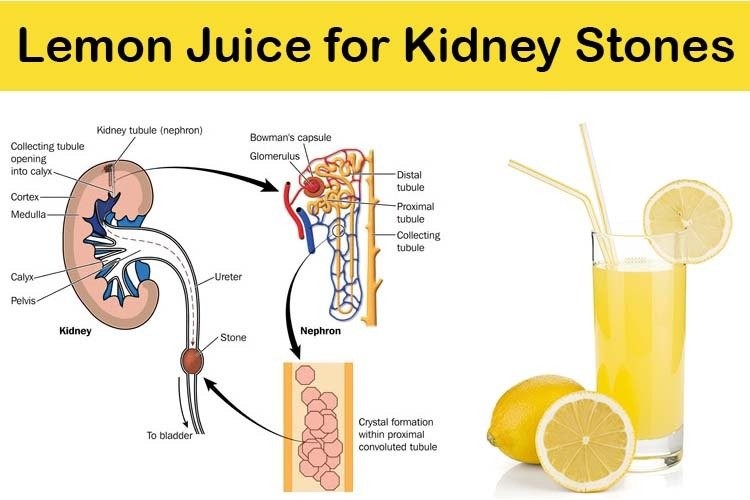
Contents
Sodium Citrate
Sodium citrate is the sodium salt of citric acid used to neutralize excessive acidity (metabolic acidosis) in the body and prevent the formation of kidney stones (nephrolithiasis). Sodium citrate increases systemic and urinary pH levels and inhibits the formation of calcium stones in the kidneys.
Citrate reacts with hydrochloric acid in the stomach and metabolizes to sodium bicarbonate, raising systemic pH levels. Kidney stones form in an acidic environment, and reducing urinary acidity prevents the crystallization of salts like calcium oxalate, calcium phosphate, and uric acid. Citrate inhibits the spontaneous nucleation of calcium oxalate and calcium phosphate, binds with urinary calcium, and increases its excretion in the urine. The higher alkalinity of urine increases the ionization of uric acid to the more soluble urate ion.
Uses of sodium citrate include:
- Metabolic acidosis and acidosis caused by certain kidney tubular disorders
- Buffer agent to neutralize gastric acidity
- Systemic alkalinizing agent
- Prevention of aspiration in patients undergoing anesthesia (off-label)
Warnings
- Do not use in patients with hypersensitivity to sodium citrate, citric acid, or any component of the formulation.
- Do not use sodium citrate in the following conditions:
- Sodium-restricted diet
- Acute dehydration and heat cramps
- Severe kidney impairment with low urine output (oliguria) or lack of urine production (anuria), and azotemia, a condition of elevated blood urea nitrogen (BUN) and creatinine
- Untreated Addison’s disease
- Adynamia episodica hereditaria, an inherited disorder that causes periodic paralysis and an increase in blood potassium levels
- High blood potassium levels (hyperkalemia)
- Severe damage to the heart muscles (myocardial damage)
- Peripheral or pulmonary edema
- Kidney impairment
- High blood pressure (hypertension)
- Heart failure
Side Effects
Common side effects of sodium citrate/citric acid include:
- Nausea
- Vomiting
- Diarrhea
- Stomach pain
- Fluid retention
- Excessive alkalinity of body fluids (metabolic alkalosis)
- Involuntary muscle contractions (tetany)
Contact your doctor immediately if you experience any of the following symptoms or serious side effects while using this drug:
- Serious heart symptoms include fast or pounding heartbeats, fluttering in your chest, shortness of breath, and sudden dizziness;
- Severe headache, confusion, slurred speech, severe weakness, vomiting, loss of coordination, feeling unsteady;
- Severe nervous system reaction with very stiff muscles, high fever, sweating, confusion, fast or uneven heartbeats, tremors, and feeling like you might pass out; or
- Serious eye symptoms include blurred vision, tunnel vision, eye pain or swelling, or seeing halos around lights.
This is not a complete list of all side effects or adverse reactions that may occur from the use of this drug. Contact your doctor for medical advice about serious side effects or adverse reactions. You may also report side effects or health problems to the FDA at 1-800-FDA-1088.
Dosages
Sodium Citrate/Citric Acid (1 mEq sodium equivalent to 1 mEq bicarbonate)
Oral Solution
- (500 mg/334 mg)/5 mL
- (500 mg/300 mg)/5 mL
- (490 mg/640 mg)/5 mL
Urine Alkalinization, Prevention of Nephrolithiasis
Adult:
- 10-30 mL diluted in up to 6 oz water/juice orally after meals and at bedtime as needed
- Follow with additional water if desired
Pediatric:
- Children below 2 years: Based on physician’s discretion
- Children 2 years and above: 5-15 mL diluted in 30-90 mL of water/juice orally after meals and at bedtime as needed
- Follow with additional water if desired
Overdose
- Sodium citrate/citric acid overdose can excessively increase the pH and alkalinity of body fluids, leading to alkalosis. The drug increases the excretion of urinary calcium, and an overdose can cause a severe drop in calcium levels, resulting in involuntary muscle contractions (tetany) and depressed heart function.
- Overdose of sodium citrate/citric acid may be treated with calcium chloride infusion and supportive care as appropriate.
Drug Interactions
Inform your doctor of all medications you are currently taking, who can advise you on any possible drug interactions. Do not start, discontinue, or change the dosage of any medication without your doctor’s recommendation.
- Sodium citrate/citric acid has no listed severe interactions with other drugs.
- Serious interactions of sodium citrate/citric acid include:
- atazanavir
- dapsone
- dasatinib
- demeclocycline
- digoxin
- doxycycline
- eltrombopag
- fleroxacin
- gemifloxacin
- indinavir
- itraconazole
- ketoconazole
- levofloxacin
- levoketoconazole
- minocycline
- moxifloxacin
- nimodipine
- nisoldipine
- nitrendipine
- ofloxacin
- oxytetracycline
- tetracycline
- aspirin
- aspirin rectal
- aspirin/citric acid/sodium bicarbonate
- balsalazide
- blessed thistle
- choline magnesium trisalicylate
- chromium
- devil’s claw
- diflunisal
- mesalamine
- salicylates (non-asa)
- salsalate
- strontium ranelate
- sulfasalazine
- willow bark
The drug interactions listed above are not all of the possible interactions or adverse effects. For more information on drug interactions, visit the RxList Drug Interaction Checker.
Always inform your doctor, pharmacist, or healthcare provider of all prescription and over-the-counter medications you use, including the dosage for each, and keep a list of the information. Consult your doctor or healthcare provider if you have any questions about the medication.
Pregnancy and Breastfeeding
- Sodium citrate/citric acid should be used during pregnancy only if clearly needed and when the maternal benefits outweigh potential fetal risks.
- Sodium citrate/citric acid may worsen high blood pressure that can occur during pregnancy (toxemia of pregnancy), so use with caution.
- It is not known if sodium citrate/citric acid is present in breast milk. Check with your healthcare provider before taking sodium citrate if you are breastfeeding.
Other Important Information
- Take sodium citrate/citric acid exactly as prescribed.
- Dilute sodium citrate with water to minimize gastrointestinal injury and administer after meals to minimize the saline laxative effect. Do not dilute in tomato juice.
- Do not take sodium citrate if you are on a sodium-restricted or no-sodium diet.
- Store safely away from the reach of children.
- In case of overdose, seek medical help or contact Poison Control.
By clicking Submit, I agree to the MedicineNet’s Terms & Conditions & Privacy Policy and understand that I may opt out of MedicineNet’s subscriptions at any time.
Summary
Sodium citrate is the sodium salt of citric acid used to neutralize excessive acidity (metabolic acidosis) in the body and prevent the formation of kidney stones (nephrolithiasis). Common side effects of sodium citrate/citric acid include nausea, vomiting, diarrhea, stomach pain, fluid retention, excessive alkalinity of body fluids (metabolic alkalosis), and involuntary muscle contractions (tetany). Consult your doctor before taking if pregnant or breastfeeding.
Sodium citrate is the sodium salt of citric acid used to neutralize excessive acidity (metabolic acidosis) in the body and prevent the formation of kidney stones (nephrolithiasis). Common side effects of sodium citrate/citric acid include nausea, vomiting, diarrhea, stomach pain, fluid retention, excessive alkalinity of body fluids (metabolic alkalosis), and involuntary muscle contractions (tetany). Consult your doctor before taking if pregnant or breastfeeding.


